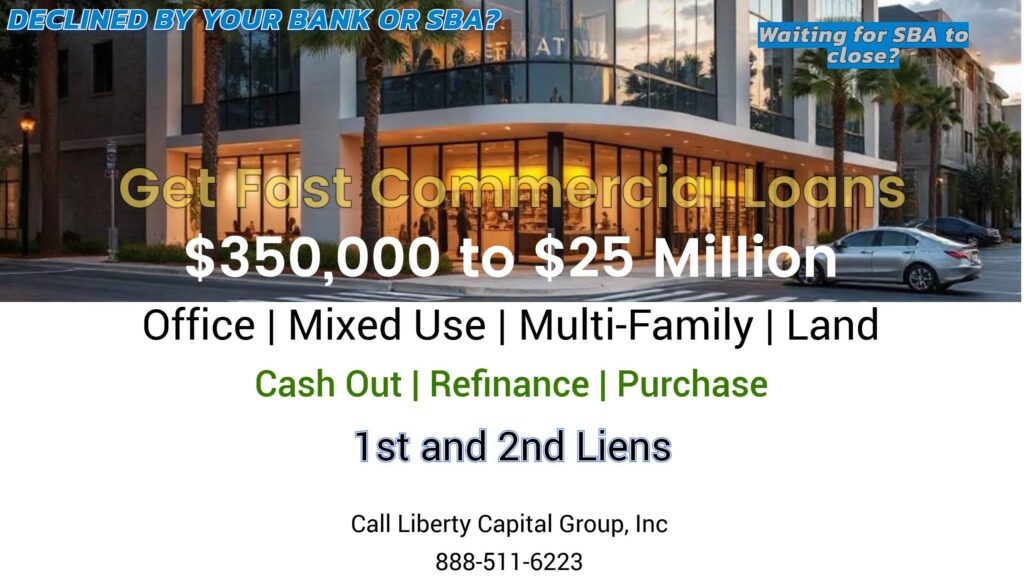Commercial Land, Mixed Use and Multi-Family Commercial Loans Guide

Commercial Land, Mixed-Use & Multi-Family Commercial Loans Guide
What lenders actually look for, how to prepare, and which product fits your deal—without choking cash flow.
Key Credit Requirements & Financial Ratios
Loan-to-Value Ratio (LTV)
LTV determines loan size relative to appraised value. Typical commercial LTV ranges 40–80% depending on property type, cash flow, and market. Expect to bring a down payment/equity (1031 exchange eligible where applicable).
- Net Operating Income (NOI) & Rent Roll must support debt.
- DSCR (Debt Service Coverage Ratio) target commonly ≥ 1.20x–1.30x.
- Global cash flow may be reviewed for small-balance/owner operators.
Tip: Stabilize occupancy and normalize expenses before appraisal—pro forma rent isn’t cash flow.
Steps to Prepare for a Commercial Loan Application
Assess Financial Health
- Review and improve personal/business credit scores.
- Ensure financials are accurate and current.
Gather Documentation
- Business and personal tax returns, YTD P&L and Balance Sheet
- Current rent roll, leases, estoppels (as available)
- Property appraisal (recent) and/or broker opinion of value
- Organizational/legal docs; use-of-funds detail
Choose the Right Lender
- Compare banks, credit unions, SBA lenders, private/bridge, CMBS shops.
- Match interest rate, term, amortization, prepay, fees to your plan.
Prepare a Strong Application
- Clean, complete package; no gaps or contradictions.
- Concise business plan & loan rationale; exit strategy.
Consult Pros
- Work with a commercial mortgage broker for optionality.
- Get advice from your CPA and real-estate counsel.
Post-Approval Considerations
- Property Management: self-manage vs. professional manager.
- Appraisal Reality: “Will it appraise?” remains a variable—underwrite conservatively.
- Maintenance & Insurance: protect NOI and asset value.
- Monitor Performance: track DSCR, occupancy, and market comps; preserve cash buffers.
Why Choose Liberty Capital for Commercial Loans
We finance commercial properties, commercial units, apartments, condos, retail, and warehouses through multiple channels—bank/portfolio, SBA, CMBS, and private/bridge. Our job is to package the file right, surface the best structure, and keep cash-flow breathing room.
- Types: Acquisition, refinance, rate/term, cash-out (where eligible), construction, mini-perm, bridge, build-out/tenant improvements.
- Sizes (typical): ~$500K to $25MM+ (small balance to mid-market). Smaller and larger considered.
- Current market (high level): lenders are disciplined on DSCR & LTV; stabilized multi-family/industrial favored; office scrutinized; land/construction require stronger equity and permits.
CMBS? Commercial Mortgage-Backed Securities are loans originated to securitize into bond pools—generally non-recourse, longer terms, defeasance/lockout prepay, and tight servicing rules. Great for stabilized, institutional-style assets; less flexible on future changes.
What Is a Commercial Loan—and What Can It Do?
- What it is: Debt secured by income-producing real estate (or business assets) with underwriting based on NOI and collateral.
- Buy a business? Yes—via SBA 7(a)/conventional business acquisition loans (with or without real estate); structure depends on collateral and cash flow.
- Buy property or land only? Yes—income property is common; land needs strong plan, zoning, and exit; pure raw land is tougher.
- Build-out/Tenant Improvements? Yes—via construction or build-out facilities; often LTC-based with draws.
- Cash-out refi on land? Generally No—unless entitled/permitted with clear path to development.
Common Commercial Loan Programs (Snapshot)
| Program | Best For | Typical LTV/LTC | DSCR / Coverage | Term / Amortization | Notes |
|---|---|---|---|---|---|
| Bank / Portfolio | Owner-occupied & stabilized investments | LTV up to ~65–75% | ≥1.25x target | 5–10yr term / 20–25yr am | Recourse common; flexible covenants |
| SBA 7(a) / 504 | Owner-occupied RE & business acquisition | Up to ~85–90% (program-dependent) | Global cash-flow tested | Up to 25yr am | Guarantee fees; strong for expansion |
| CMBS (Conduit) | Stabilized multi-tenant, larger deals | LTV up to ~60–70% | ≥1.25–1.35x | 5–10yr term / 25–30yr am | Non-recourse; prepay via defeasance |
| Bridge | Value-add, lease-up, quick close | LTV up to ~65–75% (LTC up to ~75–85%) | DSCR flexible; business plan driven | 12–36 months (interest-only) | Higher rate/fees; speed & flexibility |
| Construction | Ground-up & major build-outs | LTC ~65–80% (equity first $$ in) | Pro forma DSCR; take-out plan | Up to 36 months + mini-perm | Draws, permits, GC, GMP budget required |
| DSCR Investor Loan | 1–4 unit portfolios, SFR build-to-rent | LTV up to ~75–80% | DSCR ≥1.0–1.25x (program) | 30-yr fixed/ARM | Asset-based on rental cash flow |
Indicative only; eligibility, rates, fees and terms depend on credit, property, market, leverage, sponsor strength, and documentation.
What We Need to Start
- Online Application
- Last year’s tax returns
- Current financials (P&L & Balance Sheet)
- Recent bank statements
We waterfall intelligently: SBA → LOC/Term → Equipment/Bridge to maximize approvals with one package.
The Process
- Application: Pre-approval form & secure uploads.
- 1-on-1 Consultation: Align product, leverage, and prepay with your goals.
- Multiple Offers: Compare structures across lenders.
- Funding: Close and execute—keep DSCR healthy post-funding.
Reality Check
Don’t force the wrong product. A slightly lower LTV with flexible prepay often wins over the “cheapest rate” with handcuffs.
Call 888-511-6223